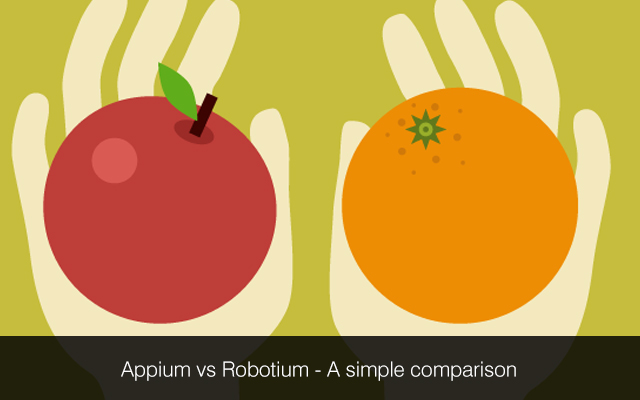 An enterprise has to focus on several factors to effectively automate its mobile testing activities. It is also important for the business to compare the available automation tools, and pick the right one according to the specific needs of the project. Many businesses even prefer using open source tools to effectuate automated testing of mobile apps without increasing project overheads. Both Appium and Robotium are open source testing frameworks that are used widely by enterprises across the world.
An enterprise has to focus on several factors to effectively automate its mobile testing activities. It is also important for the business to compare the available automation tools, and pick the right one according to the specific needs of the project. Many businesses even prefer using open source tools to effectuate automated testing of mobile apps without increasing project overheads. Both Appium and Robotium are open source testing frameworks that are used widely by enterprises across the world.Appium Automation Framework
As an open source framework, Appium is used widely by testers to create automated tests for major mobile platforms. The cross-platform test automation tool supports a variety of platforms including Android, iOS and FirefoxOS. Likewise, Appium can also be used for testing native, hybrid and mobile web applications. It runs tests by using a WebDriver interface. So the testers have option to write test cases in number of programming languages included in the WebDriver library including C#, PHP, Java, Python and Ruby.
Robotium Android Testing Tools
As an open source automated testing tool, Robotium is used frequently to evaluate a variety of Android applications. It is popularly regarded by programmers as the “Selenium for Android”. The UI testing tool further supports major versions and subversions of the Google mobile operating system. Robotium is actually a library of unit tests. While user Robotium for testing Android application, testers are required to test cases in Java.
Important Points of Distinction between Appium and Robotium
Support for Mobile Platforms: Appium is a cross-platform test automation tool, whereas Robotium is a test automation framework for Android. Robotium supports different versions and subversions of the Google mobile operating system. So it can be used for testing a wide variety of Android apps. On the other hand, Appium supports iOS and Firefox OS along with Android. It allows testers to use of standard automation APIs on different platforms. The standard automation APIs do not require the mobile apps to be modified or recompiled during testing.
Type of Application: Robotium can be used for evaluating both native and hybrid mobile applications for Android. But Appium can be used to test mobile web apps along with the native and hybrid mobile applications. It can also be used by testers to control Chrome and Safari on mobile devices. So Appium can also be used to evaluate mobile websites across these web browsers.
Option to Choose Programming Language: Robotium is designed specifically to test software for a specific mobile platform. So it does not allow testers to write test cases by choosing from a set of programming languages. While using Robotium for Android application testing, the testers are required to write test cases only in Java. But Appium is designed with a WebDriver interface that supports several programming languages. Thus, Appium enables testers to write test cases in any of the WebDriver-compatible languages including Java, PHP, C#, Ruby, Python, Perl, Objective-C, Clojure, and JavaScript with Node.js.
Performance: Both Appium and Robotium lack Record and Play functionality. But Robotium requires testing professionals to work with the source code while automating tests. So testers have to invest additional time and efforts to write test cases for Robotium. Further, the Android application testing framework cannot effectively interact with system software, and does not provide screenshots. At the same time, the performance of Appium is impacted due to reduced XPath support on mobile devices. Also, many testing professionals feel the test reports generated by Appium to be poor and inadequate.
In nutshell, a business can use Appium to test a wide variety of mobile applications, whereas Robotium can be used for testing only Android app. But a business must evaluate the pros and cons of these open source mobile testing frameworks according to the requirements of the application to be tested. To develop a stable product/application, please look out for the testing experts from a reputed quality assurance testing company.
We provide Appium Testing services. If you would like to talk one of our Appium tool experts, please get in touch with us at Mindfire Solutions.
No comments:
Post a Comment